Sociology Essay: Impact of Social Determinants on Aboriginal Health
VerifiedAdded on 2022/08/20
|6
|1385
|11
Essay
AI Summary
This essay examines the profound impact of social determinants of health on the Aboriginal community, using the case of Billy Simon as a focal point. It delves into how factors such as lack of economy, employment, healthcare access, and nutrition have shaped the lives of Aboriginal individuals and families. The essay explores the intersectionality of issues like gender, race, and class, particularly in the context of the stolen generations, and their adverse effects on mental health. It also analyzes the importance of culturally competent care frameworks, including collaboration between clinical psychologists, therapists, community nurses, and human rights workers, to address the specific mental and social needs of Aboriginal individuals. The conclusion emphasizes the necessity of cultural awareness and sensitivity in providing effective care, highlighting the lasting impact of childhood incidents and the importance of healing from past traumas.
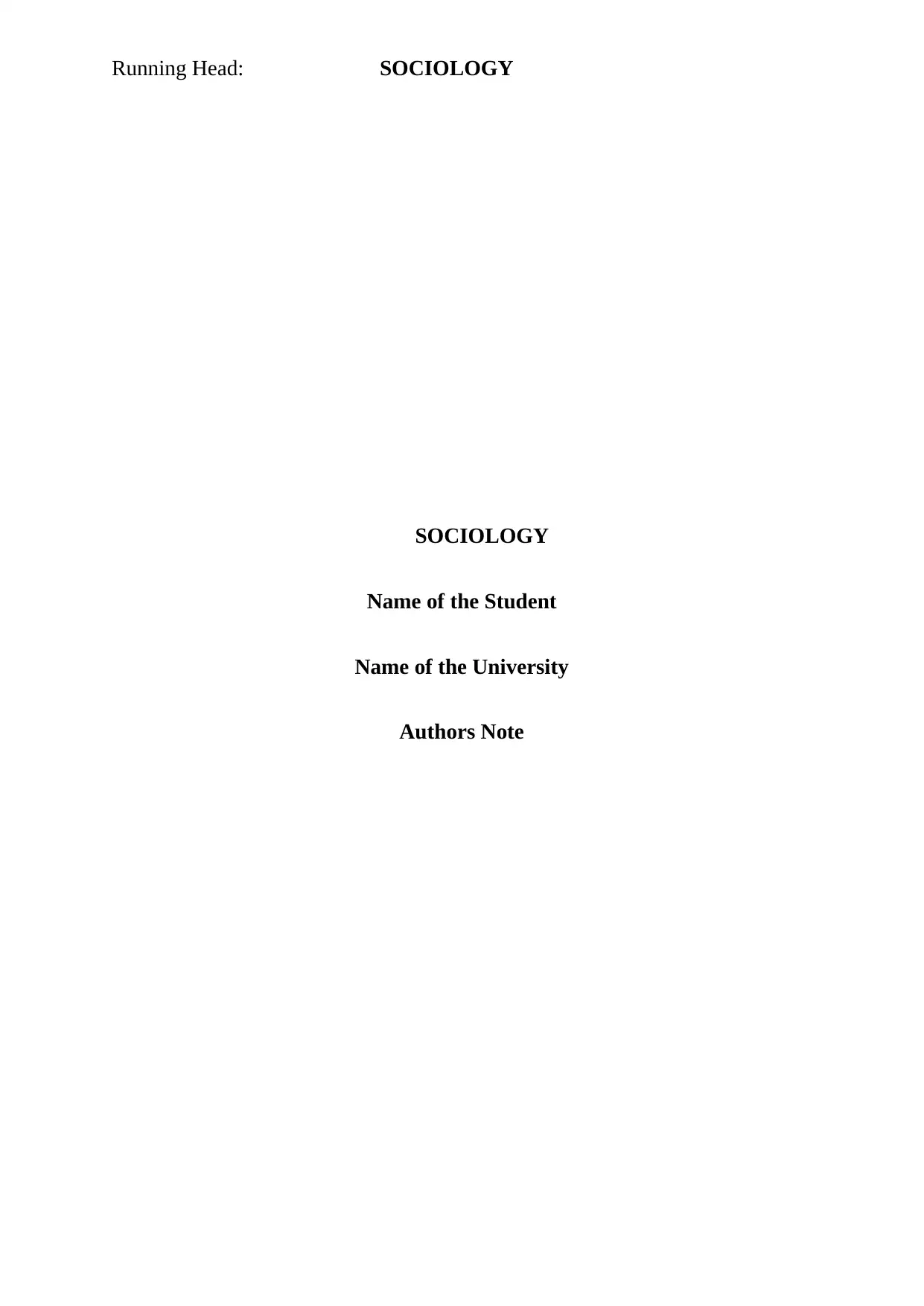
Running Head: SOCIOLOGY
SOCIOLOGY
Name of the Student
Name of the University
Authors Note
SOCIOLOGY
Name of the Student
Name of the University
Authors Note
Paraphrase This Document
Need a fresh take? Get an instant paraphrase of this document with our AI Paraphraser
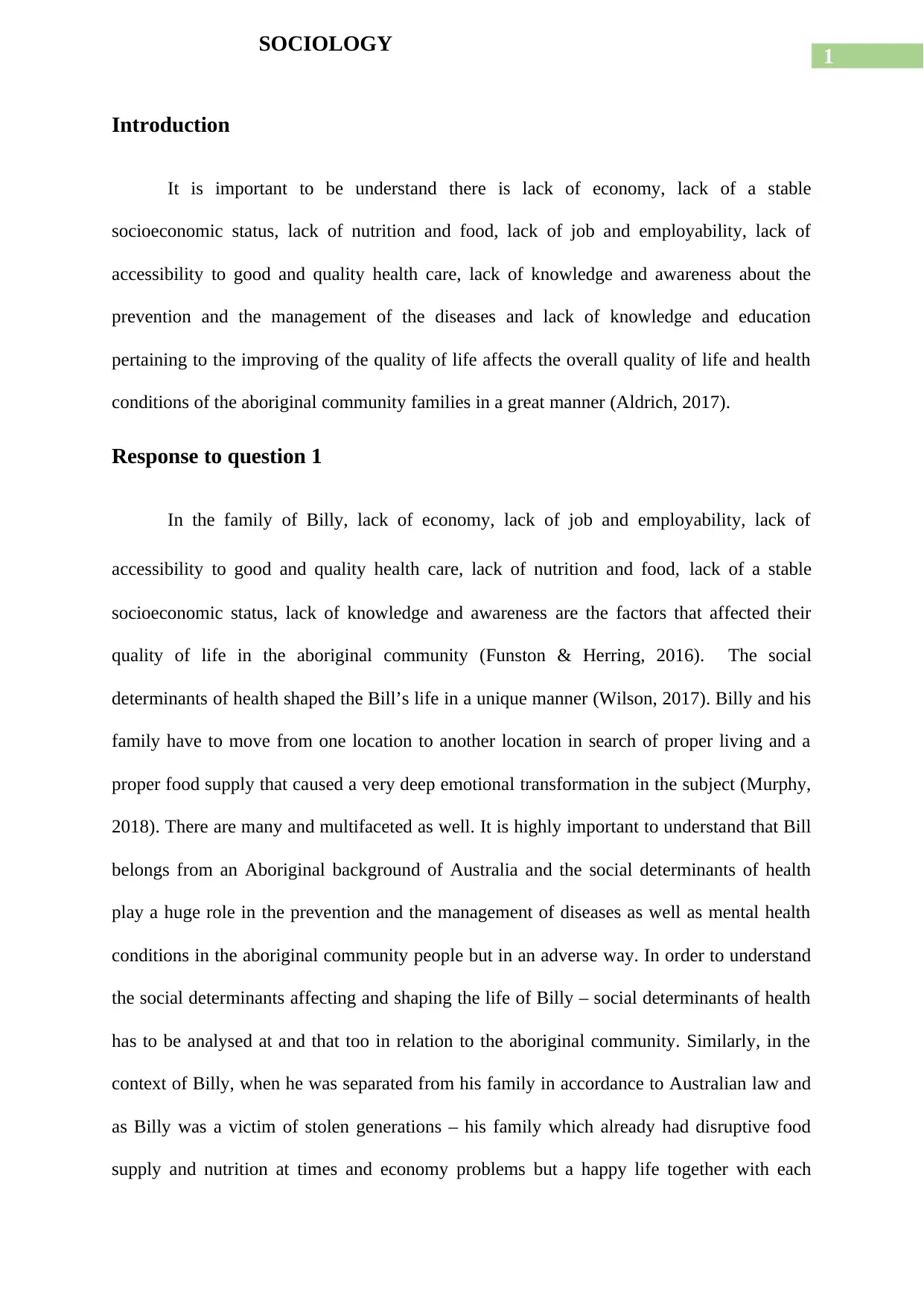
1
SOCIOLOGY
Introduction
It is important to be understand there is lack of economy, lack of a stable
socioeconomic status, lack of nutrition and food, lack of job and employability, lack of
accessibility to good and quality health care, lack of knowledge and awareness about the
prevention and the management of the diseases and lack of knowledge and education
pertaining to the improving of the quality of life affects the overall quality of life and health
conditions of the aboriginal community families in a great manner (Aldrich, 2017).
Response to question 1
In the family of Billy, lack of economy, lack of job and employability, lack of
accessibility to good and quality health care, lack of nutrition and food, lack of a stable
socioeconomic status, lack of knowledge and awareness are the factors that affected their
quality of life in the aboriginal community (Funston & Herring, 2016). The social
determinants of health shaped the Bill’s life in a unique manner (Wilson, 2017). Billy and his
family have to move from one location to another location in search of proper living and a
proper food supply that caused a very deep emotional transformation in the subject (Murphy,
2018). There are many and multifaceted as well. It is highly important to understand that Bill
belongs from an Aboriginal background of Australia and the social determinants of health
play a huge role in the prevention and the management of diseases as well as mental health
conditions in the aboriginal community people but in an adverse way. In order to understand
the social determinants affecting and shaping the life of Billy – social determinants of health
has to be analysed at and that too in relation to the aboriginal community. Similarly, in the
context of Billy, when he was separated from his family in accordance to Australian law and
as Billy was a victim of stolen generations – his family which already had disruptive food
supply and nutrition at times and economy problems but a happy life together with each
SOCIOLOGY
Introduction
It is important to be understand there is lack of economy, lack of a stable
socioeconomic status, lack of nutrition and food, lack of job and employability, lack of
accessibility to good and quality health care, lack of knowledge and awareness about the
prevention and the management of the diseases and lack of knowledge and education
pertaining to the improving of the quality of life affects the overall quality of life and health
conditions of the aboriginal community families in a great manner (Aldrich, 2017).
Response to question 1
In the family of Billy, lack of economy, lack of job and employability, lack of
accessibility to good and quality health care, lack of nutrition and food, lack of a stable
socioeconomic status, lack of knowledge and awareness are the factors that affected their
quality of life in the aboriginal community (Funston & Herring, 2016). The social
determinants of health shaped the Bill’s life in a unique manner (Wilson, 2017). Billy and his
family have to move from one location to another location in search of proper living and a
proper food supply that caused a very deep emotional transformation in the subject (Murphy,
2018). There are many and multifaceted as well. It is highly important to understand that Bill
belongs from an Aboriginal background of Australia and the social determinants of health
play a huge role in the prevention and the management of diseases as well as mental health
conditions in the aboriginal community people but in an adverse way. In order to understand
the social determinants affecting and shaping the life of Billy – social determinants of health
has to be analysed at and that too in relation to the aboriginal community. Similarly, in the
context of Billy, when he was separated from his family in accordance to Australian law and
as Billy was a victim of stolen generations – his family which already had disruptive food
supply and nutrition at times and economy problems but a happy life together with each
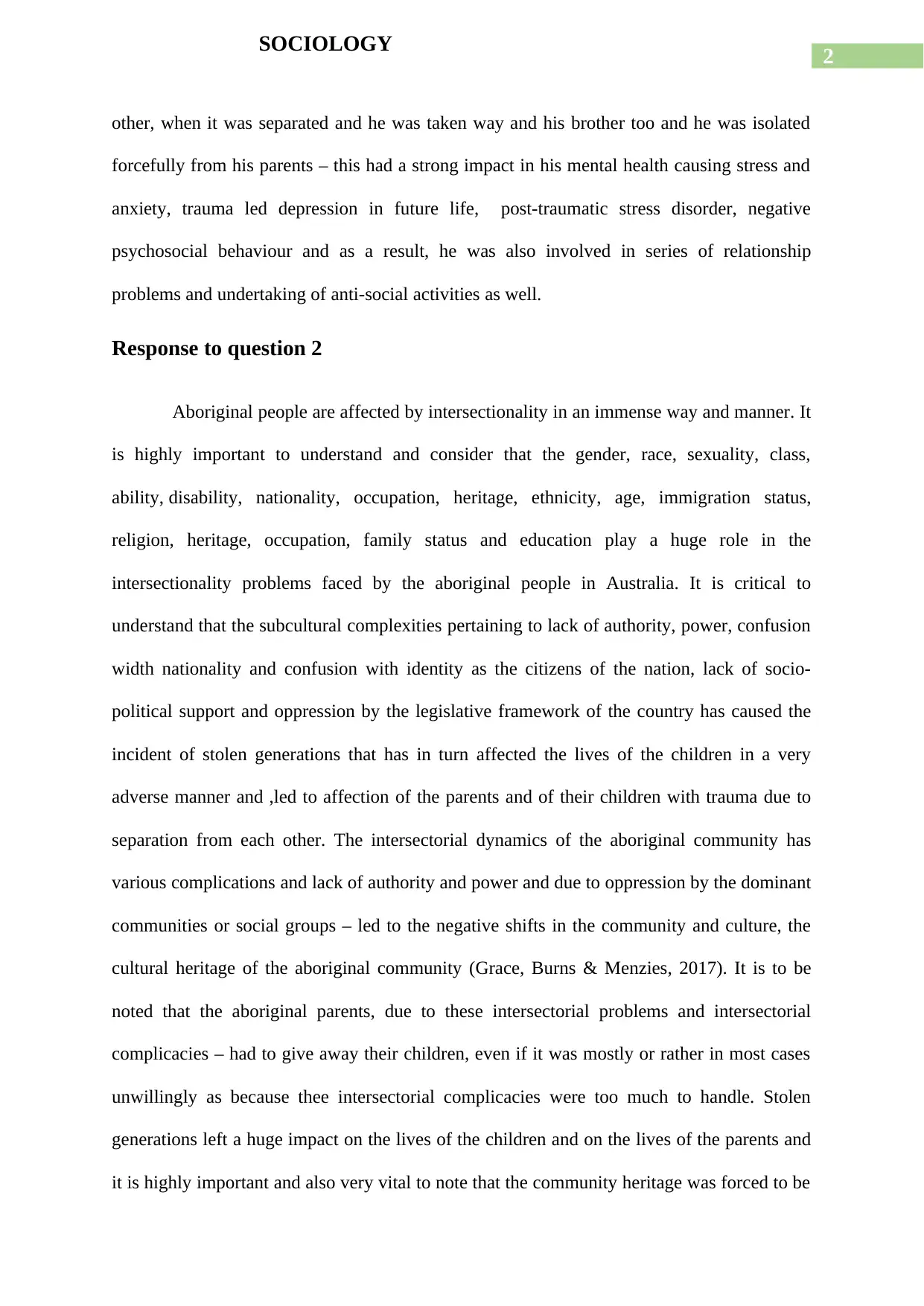
2
SOCIOLOGY
other, when it was separated and he was taken way and his brother too and he was isolated
forcefully from his parents – this had a strong impact in his mental health causing stress and
anxiety, trauma led depression in future life, post-traumatic stress disorder, negative
psychosocial behaviour and as a result, he was also involved in series of relationship
problems and undertaking of anti-social activities as well.
Response to question 2
Aboriginal people are affected by intersectionality in an immense way and manner. It
is highly important to understand and consider that the gender, race, sexuality, class,
ability, disability, nationality, occupation, heritage, ethnicity, age, immigration status,
religion, heritage, occupation, family status and education play a huge role in the
intersectionality problems faced by the aboriginal people in Australia. It is critical to
understand that the subcultural complexities pertaining to lack of authority, power, confusion
width nationality and confusion with identity as the citizens of the nation, lack of socio-
political support and oppression by the legislative framework of the country has caused the
incident of stolen generations that has in turn affected the lives of the children in a very
adverse manner and ,led to affection of the parents and of their children with trauma due to
separation from each other. The intersectorial dynamics of the aboriginal community has
various complications and lack of authority and power and due to oppression by the dominant
communities or social groups – led to the negative shifts in the community and culture, the
cultural heritage of the aboriginal community (Grace, Burns & Menzies, 2017). It is to be
noted that the aboriginal parents, due to these intersectorial problems and intersectorial
complicacies – had to give away their children, even if it was mostly or rather in most cases
unwillingly as because thee intersectorial complicacies were too much to handle. Stolen
generations left a huge impact on the lives of the children and on the lives of the parents and
it is highly important and also very vital to note that the community heritage was forced to be
SOCIOLOGY
other, when it was separated and he was taken way and his brother too and he was isolated
forcefully from his parents – this had a strong impact in his mental health causing stress and
anxiety, trauma led depression in future life, post-traumatic stress disorder, negative
psychosocial behaviour and as a result, he was also involved in series of relationship
problems and undertaking of anti-social activities as well.
Response to question 2
Aboriginal people are affected by intersectionality in an immense way and manner. It
is highly important to understand and consider that the gender, race, sexuality, class,
ability, disability, nationality, occupation, heritage, ethnicity, age, immigration status,
religion, heritage, occupation, family status and education play a huge role in the
intersectionality problems faced by the aboriginal people in Australia. It is critical to
understand that the subcultural complexities pertaining to lack of authority, power, confusion
width nationality and confusion with identity as the citizens of the nation, lack of socio-
political support and oppression by the legislative framework of the country has caused the
incident of stolen generations that has in turn affected the lives of the children in a very
adverse manner and ,led to affection of the parents and of their children with trauma due to
separation from each other. The intersectorial dynamics of the aboriginal community has
various complications and lack of authority and power and due to oppression by the dominant
communities or social groups – led to the negative shifts in the community and culture, the
cultural heritage of the aboriginal community (Grace, Burns & Menzies, 2017). It is to be
noted that the aboriginal parents, due to these intersectorial problems and intersectorial
complicacies – had to give away their children, even if it was mostly or rather in most cases
unwillingly as because thee intersectorial complicacies were too much to handle. Stolen
generations left a huge impact on the lives of the children and on the lives of the parents and
it is highly important and also very vital to note that the community heritage was forced to be
⊘ This is a preview!⊘
Do you want full access?
Subscribe today to unlock all pages.

Trusted by 1+ million students worldwide
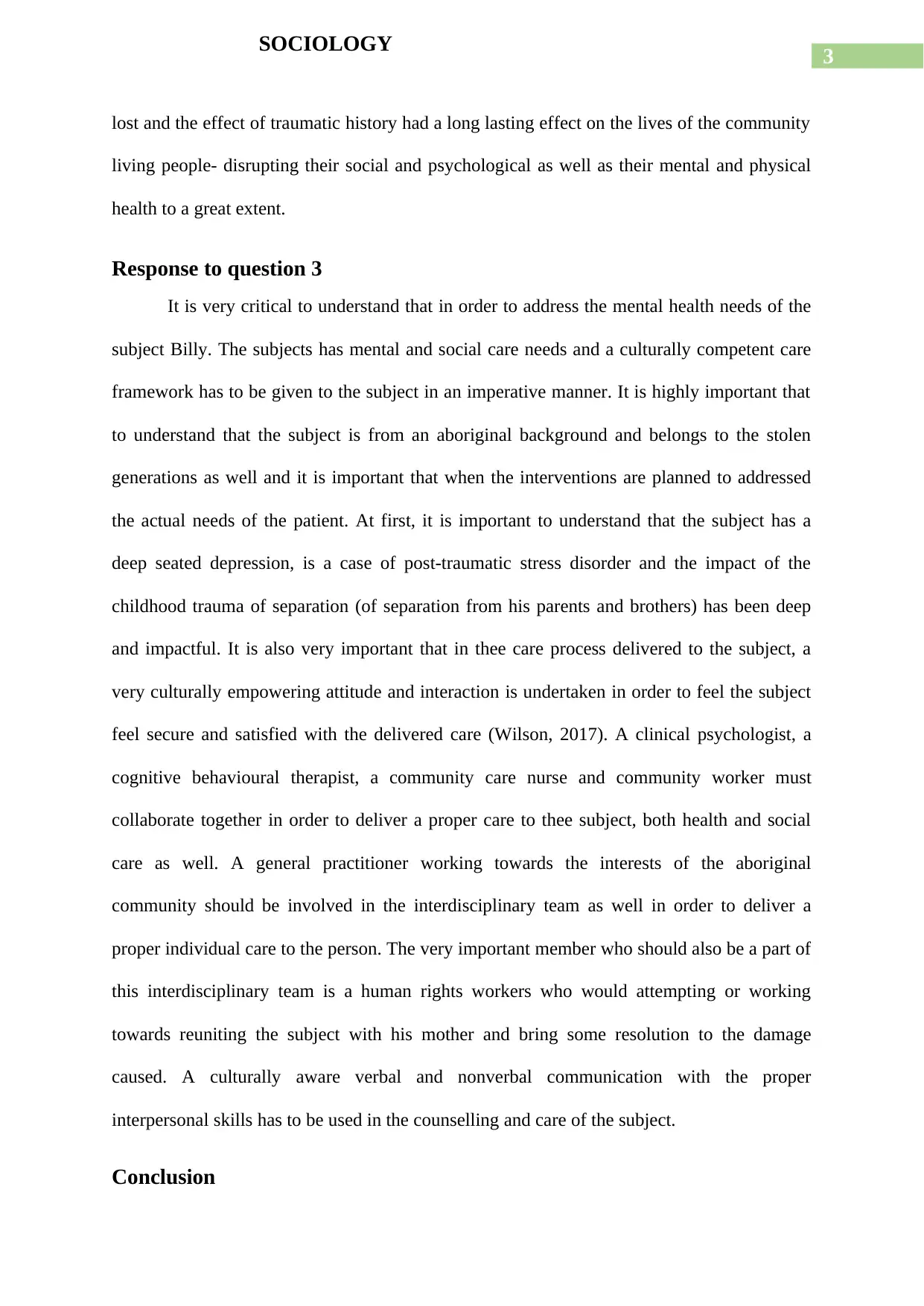
3
SOCIOLOGY
lost and the effect of traumatic history had a long lasting effect on the lives of the community
living people- disrupting their social and psychological as well as their mental and physical
health to a great extent.
Response to question 3
It is very critical to understand that in order to address the mental health needs of the
subject Billy. The subjects has mental and social care needs and a culturally competent care
framework has to be given to the subject in an imperative manner. It is highly important that
to understand that the subject is from an aboriginal background and belongs to the stolen
generations as well and it is important that when the interventions are planned to addressed
the actual needs of the patient. At first, it is important to understand that the subject has a
deep seated depression, is a case of post-traumatic stress disorder and the impact of the
childhood trauma of separation (of separation from his parents and brothers) has been deep
and impactful. It is also very important that in thee care process delivered to the subject, a
very culturally empowering attitude and interaction is undertaken in order to feel the subject
feel secure and satisfied with the delivered care (Wilson, 2017). A clinical psychologist, a
cognitive behavioural therapist, a community care nurse and community worker must
collaborate together in order to deliver a proper care to thee subject, both health and social
care as well. A general practitioner working towards the interests of the aboriginal
community should be involved in the interdisciplinary team as well in order to deliver a
proper individual care to the person. The very important member who should also be a part of
this interdisciplinary team is a human rights workers who would attempting or working
towards reuniting the subject with his mother and bring some resolution to the damage
caused. A culturally aware verbal and nonverbal communication with the proper
interpersonal skills has to be used in the counselling and care of the subject.
Conclusion
SOCIOLOGY
lost and the effect of traumatic history had a long lasting effect on the lives of the community
living people- disrupting their social and psychological as well as their mental and physical
health to a great extent.
Response to question 3
It is very critical to understand that in order to address the mental health needs of the
subject Billy. The subjects has mental and social care needs and a culturally competent care
framework has to be given to the subject in an imperative manner. It is highly important that
to understand that the subject is from an aboriginal background and belongs to the stolen
generations as well and it is important that when the interventions are planned to addressed
the actual needs of the patient. At first, it is important to understand that the subject has a
deep seated depression, is a case of post-traumatic stress disorder and the impact of the
childhood trauma of separation (of separation from his parents and brothers) has been deep
and impactful. It is also very important that in thee care process delivered to the subject, a
very culturally empowering attitude and interaction is undertaken in order to feel the subject
feel secure and satisfied with the delivered care (Wilson, 2017). A clinical psychologist, a
cognitive behavioural therapist, a community care nurse and community worker must
collaborate together in order to deliver a proper care to thee subject, both health and social
care as well. A general practitioner working towards the interests of the aboriginal
community should be involved in the interdisciplinary team as well in order to deliver a
proper individual care to the person. The very important member who should also be a part of
this interdisciplinary team is a human rights workers who would attempting or working
towards reuniting the subject with his mother and bring some resolution to the damage
caused. A culturally aware verbal and nonverbal communication with the proper
interpersonal skills has to be used in the counselling and care of the subject.
Conclusion
Paraphrase This Document
Need a fresh take? Get an instant paraphrase of this document with our AI Paraphraser
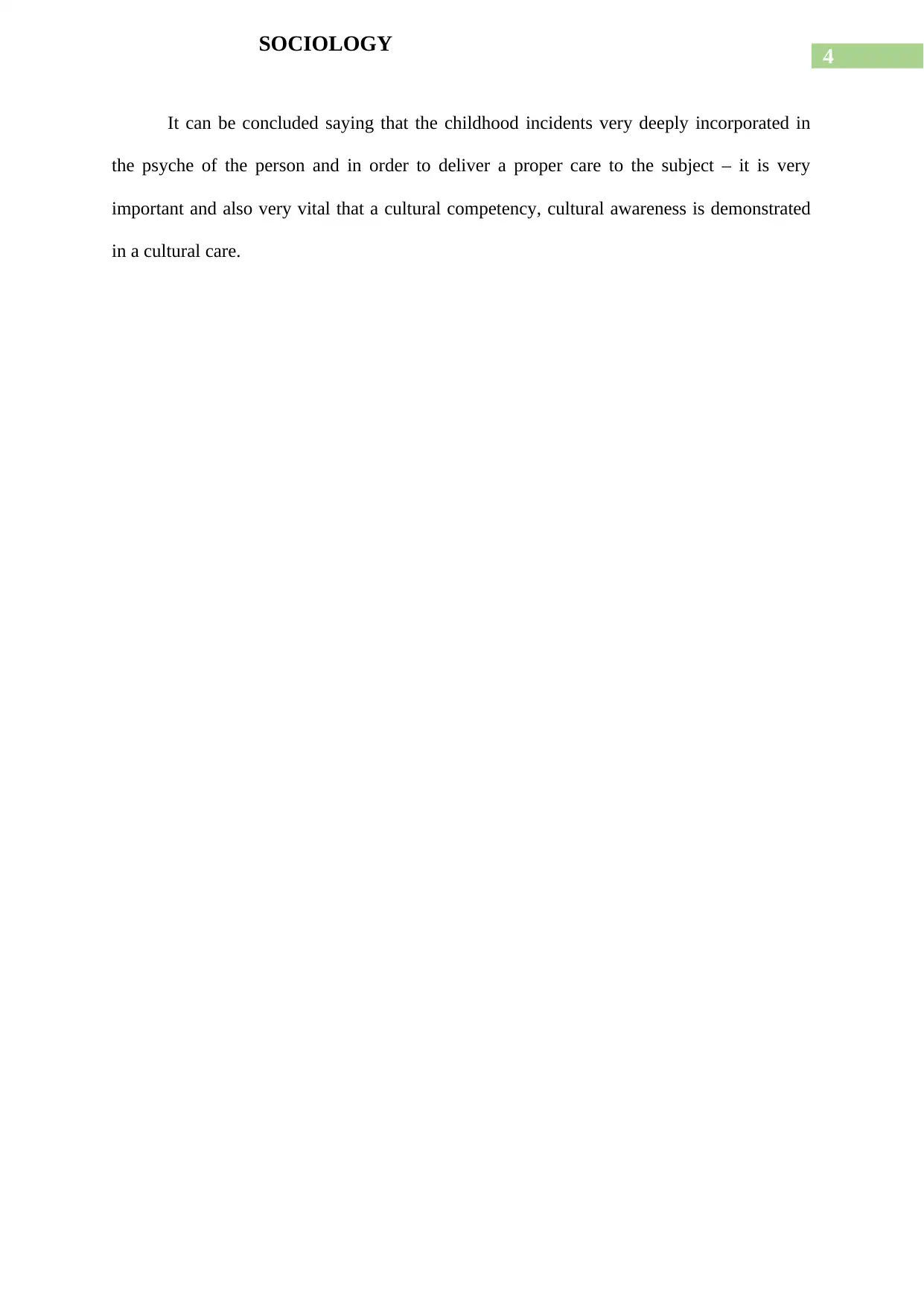
4
SOCIOLOGY
It can be concluded saying that the childhood incidents very deeply incorporated in
the psyche of the person and in order to deliver a proper care to the subject – it is very
important and also very vital that a cultural competency, cultural awareness is demonstrated
in a cultural care.
SOCIOLOGY
It can be concluded saying that the childhood incidents very deeply incorporated in
the psyche of the person and in order to deliver a proper care to the subject – it is very
important and also very vital that a cultural competency, cultural awareness is demonstrated
in a cultural care.
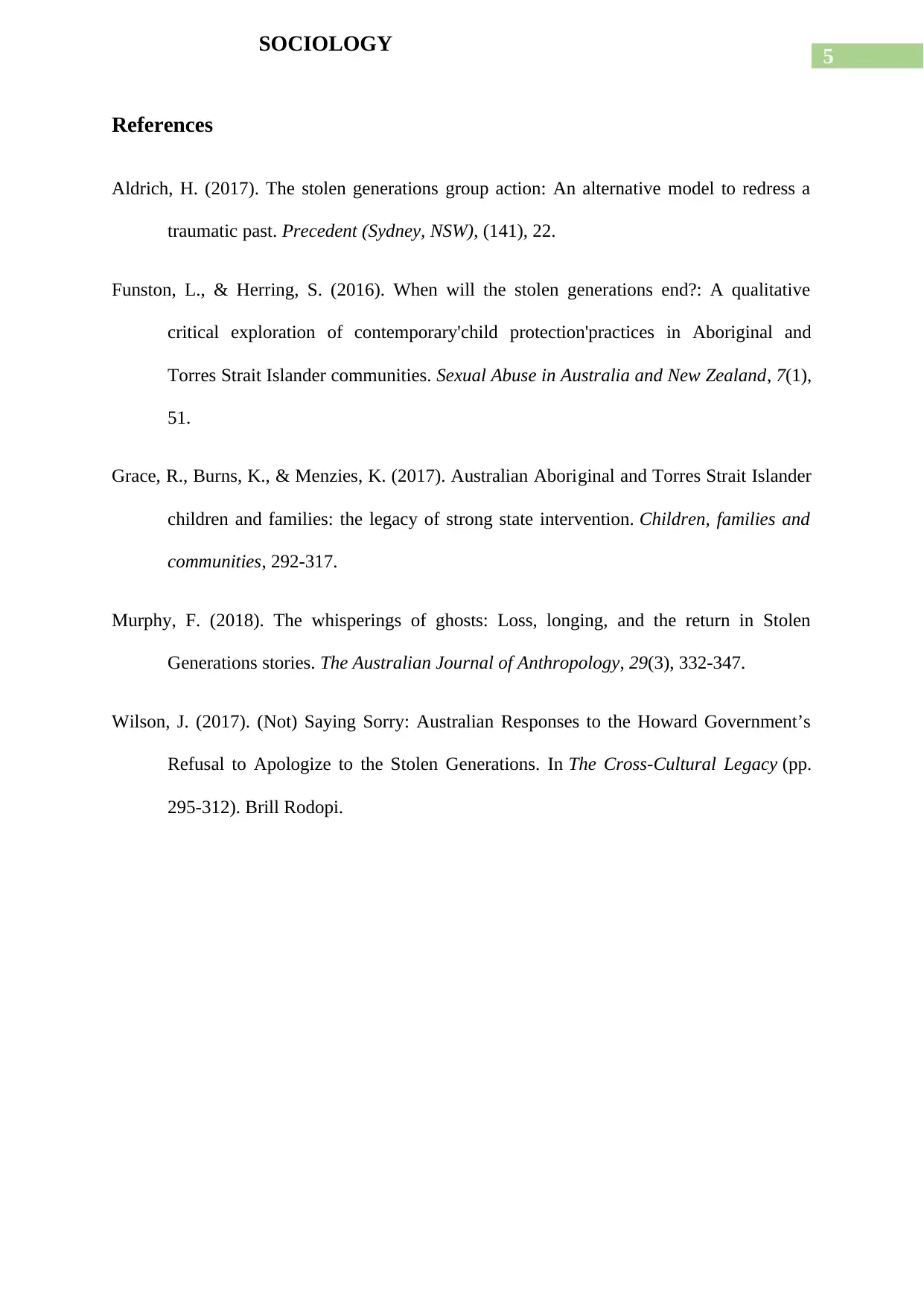
5
SOCIOLOGY
References
Aldrich, H. (2017). The stolen generations group action: An alternative model to redress a
traumatic past. Precedent (Sydney, NSW), (141), 22.
Funston, L., & Herring, S. (2016). When will the stolen generations end?: A qualitative
critical exploration of contemporary'child protection'practices in Aboriginal and
Torres Strait Islander communities. Sexual Abuse in Australia and New Zealand, 7(1),
51.
Grace, R., Burns, K., & Menzies, K. (2017). Australian Aboriginal and Torres Strait Islander
children and families: the legacy of strong state intervention. Children, families and
communities, 292-317.
Murphy, F. (2018). The whisperings of ghosts: Loss, longing, and the return in Stolen
Generations stories. The Australian Journal of Anthropology, 29(3), 332-347.
Wilson, J. (2017). (Not) Saying Sorry: Australian Responses to the Howard Government’s
Refusal to Apologize to the Stolen Generations. In The Cross-Cultural Legacy (pp.
295-312). Brill Rodopi.
SOCIOLOGY
References
Aldrich, H. (2017). The stolen generations group action: An alternative model to redress a
traumatic past. Precedent (Sydney, NSW), (141), 22.
Funston, L., & Herring, S. (2016). When will the stolen generations end?: A qualitative
critical exploration of contemporary'child protection'practices in Aboriginal and
Torres Strait Islander communities. Sexual Abuse in Australia and New Zealand, 7(1),
51.
Grace, R., Burns, K., & Menzies, K. (2017). Australian Aboriginal and Torres Strait Islander
children and families: the legacy of strong state intervention. Children, families and
communities, 292-317.
Murphy, F. (2018). The whisperings of ghosts: Loss, longing, and the return in Stolen
Generations stories. The Australian Journal of Anthropology, 29(3), 332-347.
Wilson, J. (2017). (Not) Saying Sorry: Australian Responses to the Howard Government’s
Refusal to Apologize to the Stolen Generations. In The Cross-Cultural Legacy (pp.
295-312). Brill Rodopi.
⊘ This is a preview!⊘
Do you want full access?
Subscribe today to unlock all pages.

Trusted by 1+ million students worldwide
1 out of 6
Related Documents
Your All-in-One AI-Powered Toolkit for Academic Success.
+13062052269
info@desklib.com
Available 24*7 on WhatsApp / Email
![[object Object]](/_next/static/media/star-bottom.7253800d.svg)
Unlock your academic potential
Copyright © 2020–2026 A2Z Services. All Rights Reserved. Developed and managed by ZUCOL.





